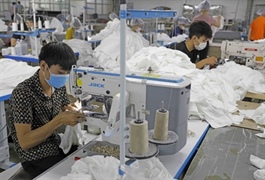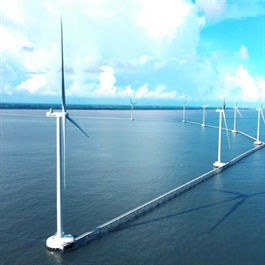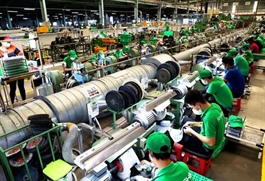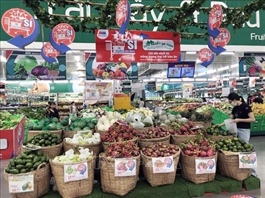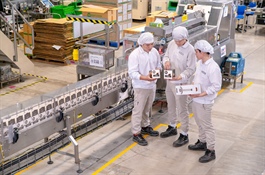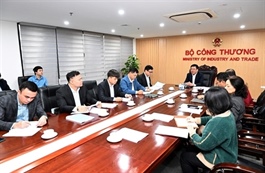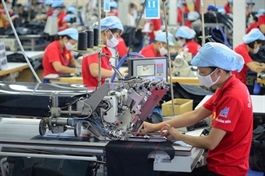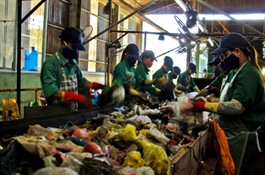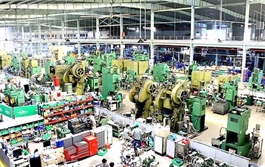Trading through commodity exchanges can bring benefits to stakeholders
Trading through commodity exchanges can bring benefits to stakeholders
Trading through commodity exchanges would help mitigate risks for both buyers and sellers and create fair, competitive prices for Vietnamese agricultural products as well as prevent the recurring crashing of prices when farmers have bumper crops, speakers told a seminar in HCM City late last week.

A panel discussion as part of the seminar on Buying and Selling through the Commodity Exchange held by Doanh nghiệp & Hội nhập magazine in HCM City on January 12. — Photo courtesy of the organiser |
At the seminar "Buying and Selling through Commodity Exchange - Sustainable Business Solutions, Multiplying Profits" held by Doanh nghiệp & Hội nhập magazine, Phạm Hải Tùng, deputy chairman of the Vietnam Association of Small and Medium Enterprises, said commodity exchange is popular around the world.
Indices of a number of reputable commodity exchanges have become benchmarks for the world market, he said.
While it is possible to trade in physical commodities, it is far more common to trade in financial contracts based on commodity prices, known as derivatives.
Tùng said the Mercantile Exchange of Vietnam (MXV) was established by the Ministry of Industry and Trade in 2010. The legal corridor for trading on the exchange is as open as at international exchanges.
MXV currently lists 45 products under five commodity groups connected to eight major commodity exchanges in the world.
By the end of August 2023, the number of accounts on the MXV platform reached more than 30,000. The average transaction value per session in the first eight months of last year was VNĐ4 trillion (US$163.4 million), with the peak session topping VNĐ9.5 trillion ($388.2 million).
Dr. Đinh Thế Hiển, director of the Research Institute of Informatics and Applied Economics, said the commodity exchange plays an important role in the process of developing a market economy, a financial market and an agricultural market.
“When participating in the commodity exchange, a farmer can sell the crop in advance at a known price via futures contracts, manufacturers can purchase raw materials in advance to hedge against a potential rise in input prices in the future, saving on storage fees, while exporters can sell in advance to fulfill price commitments with foreign customers, and investors can make profits through the use of leverage," Hiển said.
Participating in the commodity exchange will also help create fair, competitive prices for Vietnamese agricultural products and prevent prices of produce from plummeting when farmers have bumper crops, and enable farmers to directly access the market and connect with the global agricultural market.
Nguyễn Quốc Thịnh, chairman of Gia Cát Lợi Commodity Trading JSC, said that participating in the commodity exchange may bring superior returns to investors and businesses regardless of the market's ups and downs. The market features flexible transaction time, high liquidity and fast transactions. In particular, investors do not bear much inventory risks when trading on the exchange.
However, according to Hiển, the Mercantile Exchange of Vietnam has not fully promoted its role in contributing to the development of the agriculture industry and creating benefits for farmers and agricultural production companies.
Products listed on the exchange are of foreign commodity exchanges, without any domestic products listed on the MXV platform yet despite Việt Nam having strengths in the production and export of Robusta coffee, pepper, rice, seafood and other farm produces.
Therefore, MXV needs to do more in order to bring more benefits to local agriculture, farmers and businesses, he said.
Lương Văn Tự, former chairman of the Vietnam Coffee and Cocoa Association, said that there is huge potential for selling agricultural products through commodity exchanges. But this is a form of investment, so there is still potential risk if investors do not have knowledge and experience.
He noted that they need to participate in professional training courses before joining in the market. They also need to keep abreast with market information and factors that could affect prices, he added.




